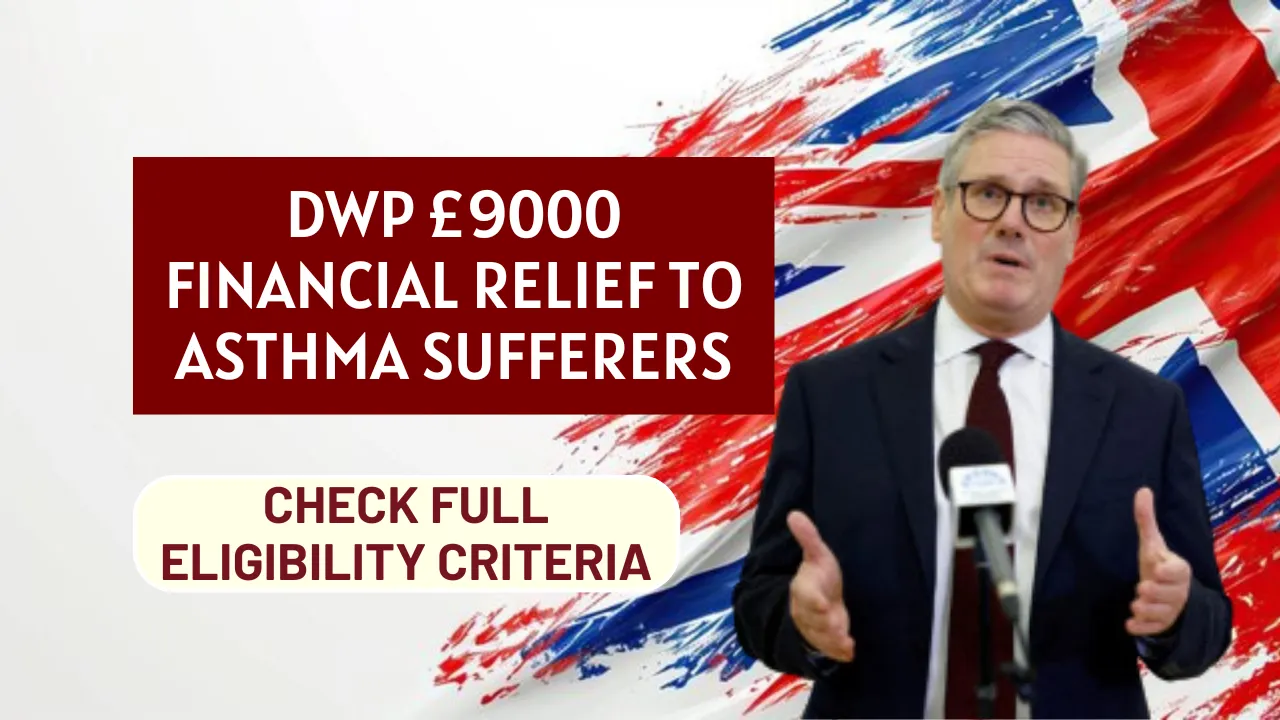DWP £9000 Financial Relief: Living with asthma or another respiratory condition can carry significant daily costs—from inhalers and home oxygen to frequent doctor visits. To ease this burden, the Department for Work and Pensions (DWP) offers DWP £9000 Financial Relief annually through the Personal Independence Payment (PIP) scheme. Covering both care and mobility needs, PIP supports those whose health issues affect their daily independence.
The DWP £9000 Financial Relief represents maximal support when both enhanced components of PIP are granted. This relief is non-means-tested and tax-free, designed to help those struggling to manage everyday life due to their health. Understanding eligibility and claim process is crucial to accessing this vital aid.
£9000 Financial Relief: What It Is
The DWP £9000 Financial Relief is the potential maximum annual support available through PIP, amounting to up to £9,000 for those qualifying at enhanced rates for both components. This benefit recognizes the extra costs and care needs of people with long-term respiratory conditions, offering financial security and independence.
Overview Table
| Feature | Details |
| Benefit Name | Personal Independence Payment (PIP) |
| Max Annual Relief | Approx. £9,000 per year (enhanced Daily Living + Mobility) |
| Components | Daily Living and Mobility |
| Weekly Rates 2025/26 | Daily: £73.90 (standard), £110.40 (enhanced); Mobility: £29.20 (standard), £77.05 (enhanced) |
| Pay Frequency | Every 4 weeks |
| Qualifying Conditions | Respiratory issues including asthma, COPD, cystic fibrosis, and more |
| Qualifying Period | Symptoms impacting daily life for ≥3 months, with ≥9 months more expected |
| Residency | UK resident for at least 2 of the last 3 years |
| Assessment Method | Independent assessment—phone, video, or in-person |
| Expected Result Release | Within ~12 weeks of assessment |
| Check Results | Online via Gov.uk or DWP helpline |
What is Personal Independence Payment (PIP)?
PIP is a benefit designed to support people aged 16–64 with long-term health conditions or disabilities that affect their daily living or mobility. It has two separate parts:
- Daily Living Component: Helps with everyday tasks like dressing, cooking, eating, and personal care.
- Mobility Component: Aids with physical movement and planning/based navigation outside home.
PIP is available regardless of income or savings and does not affect other benefits. Those eligible may receive one or both components—standard or enhanced.
Respiratory Conditions That Qualify for PIP
You may be eligible for DWP £9000 Financial Relief with PIP if you live with any of the following conditions, provided they significantly affect daily life:
- Severe asthma
- Chronic Obstructive Pulmonary Disease (COPD)
- Cystic fibrosis
- Asbestosis or pneumoconiosis
- Pulmonary fibrosis
- Chronic bronchitis or emphysema
- Sleep apnea
- Bronchiectasis
- Sarcoidosis
The deciding factor is the impact on your ability to perform daily tasks and to get around.
How Much Could You Receive from PIP?
Weekly PIP rates for 2025/26 are as follows:
- Daily Living:
- Standard: £73.90
- Enhanced: £110.40
- Standard: £73.90
- Mobility:
- Standard: £29.20
- Enhanced: £77.05
- Standard: £29.20
At maximum, the combined enhanced rate totals £187.45 per week, which equates to £749.80 every four weeks, or approximately £9,748 annually—justifying the “£9000 Financial Relief” reference.
How to Qualify for PIP
To qualify for the DWP £9000 Financial Relief, ensure:
- Your respiratory condition affects daily living or mobility for at least three months and is expected to continue for at least nine more months.
- You have lived in the UK for at least two of the last three years.
During the assessment, medical professionals will evaluate how much help you need with daily tasks—like preparing meals, cleaning, dressing—as well as your ability to move around or travel outside your home.
How to Apply for PIP
Claiming the DWP £9000 Financial Relief involves:
- Starting the Claim: Contact the DWP via phone or online to request a PIP claim form.
- Submitting Details: Include information about your respiratory condition, treatments, and the impact on your daily life.
- Assessment: You will undergo a review—either in person, by phone, or video call—with a health professional.
- Documentation: Provide supporting medical evidence, such as GP records or test reports.
- Decision: PIP assessment results are generally provided within 12 weeks of your appointment.
When and Where Results Are Released
Following your PIP assessment, expect your result within approximately 12 weeks. The outcome letter will outline which components and rates are awarded. You can:
- View your award online through your DWP account
- Call the DWP helpline if you prefer verbal confirmation or have questions
- Receive a letter by post detailing your entitlement
Once approved, PIP payments arrive every four weeks, supporting you continually as long as your entitlement is valid.
Final Thoughts
For individuals living with asthma or other respiratory conditions, the DWP £9000 Financial Relief through PIP can meaningfully improve independence and quality of life. This support covers both daily living and mobility needs, offering vital financial help.
If your condition heavily impacts daily routines and mobility, it’s well worth understanding your eligibility and applying promptly. With proper evidence and honest self-reporting, you could secure this critical support—no small amount when it eases health and financial challenges.
FAQs
1. What counts as asthma-related evidence for PIP?
Your GP’s records, hospital letters, lung function tests, and notes on frequent inhaler use or exacerbations can help prove your need for support.
2. Can I receive the full £9000 yearly?
Yes—if awarded both enhanced daily living and enhanced mobility components, you could receive approximately £9,748 over 12 months.
3. How long does the application take?
The process—from form to assessment results—usually takes about 12 weeks after submitting your medical appointment.
4. Can terminally ill asthma patients get PIP?
Yes; those who are terminally ill may receive PIP without the standard qualifying period—find details on Gov.uk under terminal illness rules.
5. What should I do if I get a lower award than I expected?
If you disagree with the decision, you can request a mandatory reconsideration. If still dissatisfied, you can appeal at an independent tribunal.













